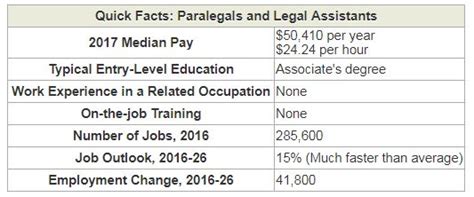The legal field offers a dynamic and rewarding career path, and you don't need a law degree to be at the heart of the action. For those with a passion for law, meticulous attention to detail, and strong organizational skills, a career as a paralegal assistant is an excellent choice. This vital role not only provides a stable career but also comes with significant financial potential, with salaries often ranging from $40,000 for entry-level positions to over $95,000 for senior specialists in high-demand markets.
This guide will break down the salary of a paralegal assistant, exploring the key factors that influence your earning potential and the bright future this career holds.
What Does a Paralegal Assistant Do?

Often considered the backbone of a legal team, a paralegal or legal assistant works under the supervision of an attorney to perform a wide variety of substantive legal work. While they cannot give legal advice or represent clients in court, their contributions are essential to the efficiency and success of a law firm or corporate legal department.
It's important to note that the terms "paralegal" and "paralegal assistant" or "legal assistant" are often used interchangeably. The U.S. Bureau of Labor Statistics (BLS) groups them into the same category, reflecting their similar core responsibilities.
Key duties typically include:
- Conducting legal research and fact-finding investigations.
- Drafting legal documents such as contracts, pleadings, and discovery requests.
- Organizing and managing case files, exhibits, and other critical documents.
- Assisting with trial preparation, including organizing evidence and coordinating witnesses.
- Communicating with clients, court officials, and other legal professionals.
Average Paralegal Assistant Salary

When analyzing salary, it's helpful to look at both the median wage and the typical range to understand the full picture.
According to the most recent data from the U.S. Bureau of Labor Statistics (BLS), the median annual wage for paralegals and legal assistants was $60,970 per year as of May 2023. This means half of all paralegals earned more than this amount, and half earned less.
However, this single number doesn't tell the whole story. The salary range is quite broad:
- The lowest 10 percent earned less than $40,910. This typically represents entry-level positions in lower-cost areas.
- The highest 10 percent earned more than $96,960. This reflects senior-level paralegals with specialized skills in high-paying industries and locations.
Other authoritative sources provide similar figures. For example, Salary.com reports the median salary for a Paralegal I (an entry-to-intermediate level role) in the United States is around $64,881 as of 2024, with a common range falling between $57,675 and $73,197. This data reinforces that a salary well above the national median is achievable.
Key Factors That Influence Salary

Your specific salary as a paralegal assistant will depend on a combination of critical factors. Understanding these variables can help you strategically plan your career to maximize your earning potential.
###
Level of Education
While you can enter the field with an Associate's degree, your educational background plays a significant role in your starting salary and long-term opportunities.
- Associate's Degree: This is a common entry point into the profession. It provides the foundational knowledge needed to secure an entry-level position.
- Bachelor's Degree: Employers, especially large law firms and corporate legal departments, often prefer candidates with a four-year degree. A Bachelor's degree can command a higher starting salary and provides a stronger platform for advancement into senior or managerial roles.
- Paralegal Certificate: A certificate from an American Bar Association (ABA)-approved program is highly valued. Whether you have an Associate's or Bachelor's degree, adding this credential demonstrates a specialized skill set and can significantly boost your marketability and pay.
- Advanced Certifications: Earning voluntary certifications, such as the Certified Paralegal (CP) credential from NALA, The Paralegal Association, can further increase your earning power by validating your expertise.
###
Years of Experience
Experience is one of the most powerful drivers of salary growth. As you gain more practical skills and a deeper understanding of legal procedures, your value to an employer increases substantially.
- Entry-Level (0-2 years): Paralegals in this phase are learning the ropes and typically handle more administrative tasks. Salaries will be closer to the lower end of the national range, from $40,000 to $55,000.
- Mid-Career (3-9 years): With several years of experience, you can manage cases with more autonomy. Your salary will likely align with or exceed the national median, falling in the $55,000 to $75,000 range.
- Senior/Experienced (10+ years): Senior paralegals often specialize, manage complex cases, and may even supervise junior staff. Their expertise is highly compensated, with salaries frequently exceeding $75,000 and pushing past $90,000 in some cases.
###
Geographic Location
Where you work matters immensely. Salaries are closely tied to the cost of living and the demand for legal services in a specific metropolitan area.
According to the BLS, the top-paying states for paralegals and legal assistants are:
1. District of Columbia: $89,700 (average annual mean wage)
2. California: $76,170
3. Washington: $74,270
4. Colorado: $70,880
5. Massachusetts: $69,720
Working in a major metropolitan area like Washington D.C., San Francisco, New York City, or Boston will almost always result in a higher salary than working in a smaller town or rural area.
###
Company Type
The type of organization you work for has a direct impact on compensation. The BLS highlights significant pay differences across industries.
- Federal Government: This is one of the highest-paying sectors, with an annual mean wage of $81,580.
- Finance and Insurance: Paralegals working in the legal departments of financial corporations are also top earners.
- Large Corporate Law Firms: "Big Law" firms that serve major corporate clients typically offer the most competitive salaries and bonuses to attract top talent.
- Smaller Private Law Firms: These firms may offer salaries closer to the national median but can provide better work-life balance and broader hands-on experience.
- Government (State and Local) & Non-Profit: While these sectors often pay less than their corporate counterparts, they can offer excellent benefits, job security, and a strong sense of purpose.
###
Area of Specialization
Just as with attorneys, specializing in a complex or high-demand area of law can lead to a much higher salary.
High-paying specializations include:
- Corporate Law: Assisting with mergers and acquisitions, securities, and corporate governance.
- Intellectual Property (IP): Working on patents, trademarks, and copyrights.
- Litigation & E-discovery: Managing the complex discovery process for large-scale lawsuits, a highly technical and sought-after skill.
- Commercial Real Estate: Handling complex property transactions.
Other fields like family law, immigration, or criminal defense are incredibly rewarding but may offer salaries that are closer to the national median.
Job Outlook

The future is bright for aspiring paralegal assistants. According to the BLS, employment for paralegals and legal assistants is projected to grow 12 percent from 2022 to 2032, which is much faster than the average for all occupations.
This robust growth is driven by the need for law firms and other organizations to increase efficiency and reduce costs. By hiring paralegals to perform tasks once handled by attorneys, they can deliver legal services more affordably, creating strong and sustained demand for qualified professionals.
Conclusion

A career as a paralegal assistant is a fantastic pathway to a stable, engaging, and financially rewarding profession within the legal world. While the national median salary hovers around $61,000, your potential earnings can be significantly higher.
By focusing on a strong educational foundation, gaining valuable experience, targeting high-paying geographic markets and industries, and developing a sought-after specialization, you can build a career that is not only fulfilling but also highly compensated. For anyone considering this path, the data is clear: the opportunity for growth is exceptional.
